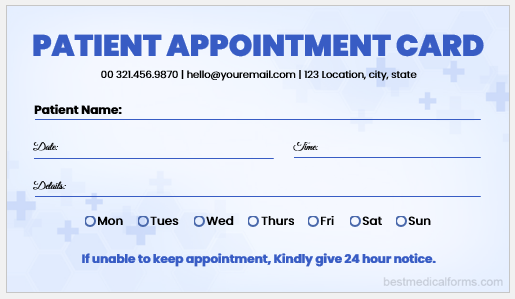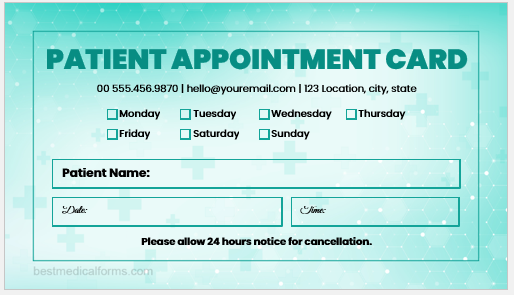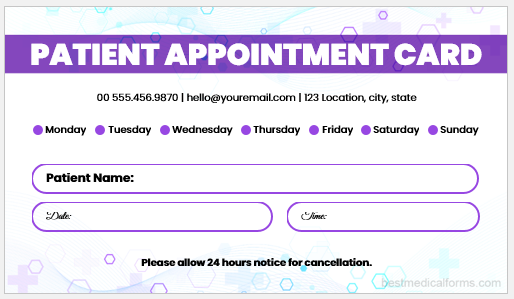Patient appointment cards are small cards that contain essential information about a scheduled medical appointment. These cards comprise the contact information of the healthcare provider as well as the schedule, duration, location, and purpose of the appointment.
Patient appointment cards can be put to use in various healthcare settings, such as hospitals, clinics, and private practices as these cards remain a valuable tool for providing means of communication between healthcare resources and patients and ensuring that they receive the care they need. They can improve patient satisfaction, reduce missed appointments, and make the use of healthcare resources more accessible and efficient.
As healthcare continues to evolve, patient appointment cards may be adapted or replaced by new technologies, but for now, they remain a reliable and useful tool in healthcare settings.
Contents of the card
A patient appointment card typically contains the following information:
- Date: The date on which the appointment is scheduled.
- Time: The time of the appointment, including the start and end times.
- Location: The location of the appointment, including the name and address of the healthcare provider.
- Purpose: The reason for the appointment, including any special instructions or requirements.
- Healthcare provider information: The name and contact information of the healthcare provider, including phone number, email address, and website.
- Appointment confirmation: The appointment card may also include a confirmation of the appointment, including the date and time of confirmation and any additional information.
#1

Card File
#2

Card File
#3

Card File
#4

Card File
#5

Card File
Use cases
Patient appointment cards are useful in a variety of healthcare settings. One important usage is that they can serve as reminders for patients about their scheduled appointments. Patients can keep the cards in a visible location to remember the date and time of their appointment.
Similarly, many healthcare settings employ patient appointment cards as a means of communication between the healthcare provider and the patient. In this way, in the event of rescheduling or canceling the appointment, the healthcare provider can notify the patient through the appointment card.
Patient appointment cards can also help healthcare providers manage their schedules more efficiently. By providing patients with appointment cards and reminding them of their scheduled appointments, healthcare providers can reduce the number of missed or forgotten appointments, make more efficient use of their time, and help patients comply more with their treatment plans.
As the patients are treated respectfully, with care, and reminded soundly, they are more comfortable attending their appointments, which can improve their health outcomes.
Significance of using the card
Patient appointment cards are significant in many ways.
- Improved patient satisfaction: Patient appointment cards can help improve patient satisfaction by providing patients with clear and concise information about their appointments. This can help reduce anxiety and uncertainty about the appointment.
- Reduced missed appointments: Patient appointment cards can also help reduce the number of missed appointments. Physical reminders always make appointments more noticeable and patients are more likely to attend to them.
- More efficient use of healthcare resources: By reducing the number of missed appointments, healthcare providers can use their time and resources more efficiently. This can result in better patient care and outcomes.
- Improved patient compliance: Patient appointment cards can also improve patient compliance with their treatment plans. This can also help with positive feedback, as patients who attend their appointments as scheduled are more likely to follow through with their treatment plans, leading to better health outcomes.
- Nursing Documentation Templates
- Mental Health Evaluation Forms
- Forms Used by Pediatricians
- Various Forms Related to Pregnancy Verification
- Common Forms Used by ENT Specialists
- Pain Diary Worksheet Template
- Forms Commonly Used by Old Age Homes
- Medical Treatment Consent Form
- Home Exercise Program Worksheet
- Forms Used for Mental Health Assessment
- Forms Used by Psychologists
- Medical Forms Commonly Used by/for Students
- Assessment Consent Form
- Forms Used by an Anesthesiologist
- Not Fit to Fly Certificate Template


